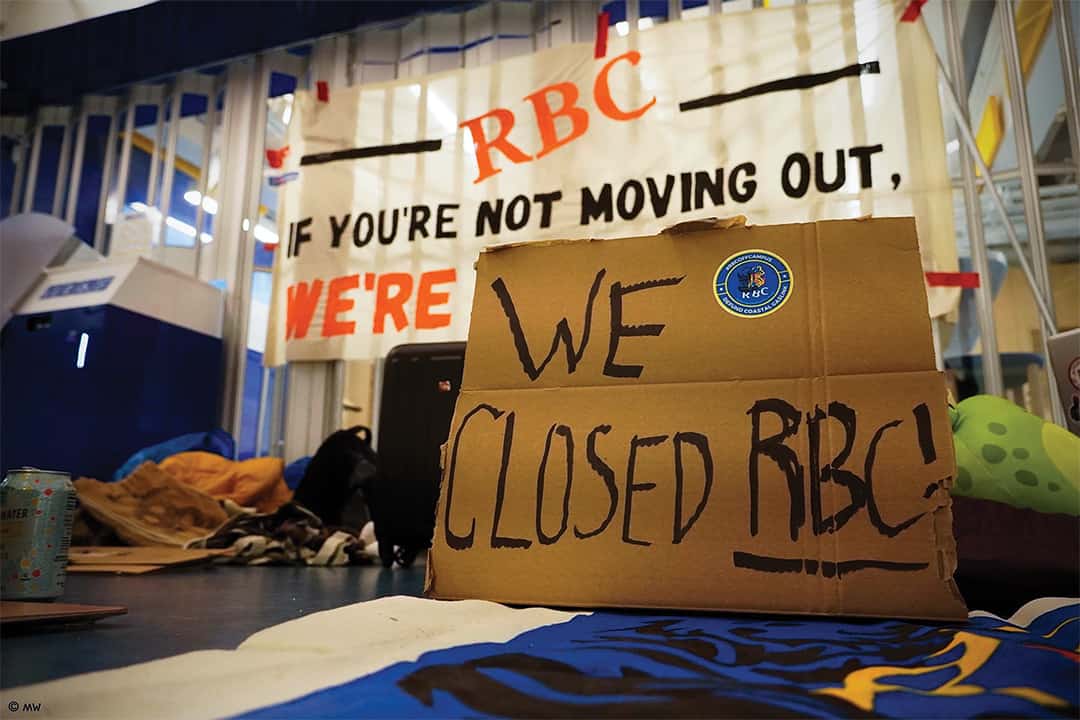On March 2, over a dozen students chanted, “If you’re not moving out, we are moving in!” while protesting against the RBC on-campus branch located at the UTSU student commons. This protest was part of a national day of action where over a dozen student groups across Canada protested RBC’s presence at their academic institutions. This protest was organized with support from Banking on a Better Future, a not-for-profit group.
Members of Climate Justice UofT, the school’s largest climate advocacy student organization, and many others occupied the RBC branch — and succeeded in closing down the branch an hour into the protest, blocking them from profiting off students for the rest of the day. Although the branch closed early, protestors continued to occupy the space until the building closed at 5:00 pm. We, Climate Justice UofT, believe there is no room for corporations like RBC — which violate Indigenous and environmental rights — at U of T, a school that is portrayed as one of the most sustainable in the world.
RBC and fossil fuels
RBC is the fifth largest global and biggest Canadian financier of fossil fuel expansion, with investments of over $263 billion since 2016. RBC finances various fossil fuel projects that directly violate Indigenous rights such as TC Energy’s Coastal Gaslink pipeline that is drilling under the Wedzin Kwa, the sacred headwaters of the Wet’suwet’en peoples as we speak. TC energy received $341 million USD in funding from RBC in 2022 alone, which is advancing this project without the consent of the Wet’suwet’en hereditary chiefs. The Wet’suwet’en people have been fighting to defend their land since February 6, 2020 when the RCMP first moved into their territory. Land defenders have been subjected to RCMP violence and arrests ever since.
As a funder of the Coastal Gaslink pipeline, RBC is sponsoring this very violence against Indigenous communities, who are calling on us to stand in solidarity and support them in pressuring RBC to divest from Coastal Gaslink.
Don’t be fooled by what they may say otherwise; RBC’s deceitful strategy of seeking student support and money by setting up campus branches across the country includes using a popular tactic known as ‘greenwashing,’ the practice of making a company appear more environmentally friendly than it truly is. RBC actively green washes on the U of T campus to give students the impression that they align with progressive values to try and take our business, but the reality proves that their values actually lie with Big Oil.
For example, earlier this year RBC invited students to partake in the ‘Innovation Challenge’ with the theme of ‘Tech for a Greener Future,’ with prizes totalling $100,000. The cost of greenwashing initiatives like this are nickels and dimes for this big bank, which invested $1.36 billion into the coal industry in 2022 alone. Students are being tricked into banking with RBC, resulting in their money being used to finance the fossil fuel industry and Indigenous oppression.
RBC and U of T
While the university and the UTSU have long partnered with RBC, the bank’s influence is now more entrenched into campus life than ever, with its striking presence at the UTSU’s Student Commons. Located at 230 College St, the Student Commons is advertised as “A place to relax, socialize or study” — yet, it is not as safe a space for students as the UTSU claims.
RBC has contracts with the UTSU that allow the bank to operate a commercial space within the Student Commons building, targeting students as they are trying to receive services and support. How can the Student Commons be a safe space when there is a constant reminder of RBC — a funder of Indigenous oppression and the climate crisis? Take note, UTSU: corporate aggressors like RBC should not be let anywhere near campus, let alone invade our sanctity.
Most importantly, however, this partnership goes against every value of the so-called environmentalism U of T has long claimed to encourage. The university cannot call itself an environmentally and socially conscious institution while keeping close ties with one of, if not the largest, financial polluter and Indigenous rights violators in Canada.
Beyond this protest, Climate Justice UofT will continue the fight with other environmental and Indigenous groups across Canada to get RBC to divest from fossil fuels. However, we hope to make a difference on our own campus as a concrete next step. Please join us by signing our petition asking the UTSU to break ties with RBC once and for all so students can learn and access services without the influence of the fossil fuel industry.
Petition Link: https://tinyurl.com/yytzj487
Or access at the Linktree in our Instagram bio @climatejusticeuoft.
Kate Martens is a second-year undergraduate student at U of T studying political science. Kate is Climate Justice UofT’s media liaison for the RBC Off Campus campaign and was one of many organizers of the March 2 protest.


